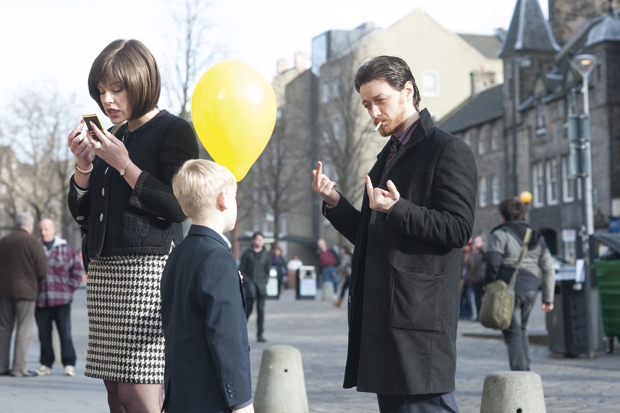People are generally saying Filth fully fulfils the promise of its title and is not for the faint of heart or queasy of stomach or lily of liver and, alas, I am all three, in spades. (My liver is, in fact, so lily-ish it may be a wonder of medical science.) Rape. Anal Sex. Violence. Drink. Drugs. Masturbation. Vomiting down yourself. There’s a part of me that would like to say that’s the average Saturday night in our house, but the truth is we generally watch The X Factor and record Strictly. So I endured this film, from behind my hands, rather than enjoyed it, but in the enduring, was there some reward, as can sometimes happen? We can work that out as we go along. No advantage in rushing such things.
Based on the Irvine Welsh novel of the same name, it stars James McAvoy, who I should say, straight off, is absolutely terrific, and may provide the strongest reason for sitting through this. McAvoy plays Bruce Robertson and Bruce Robertson is Filth. He’s Filth because he’s an Edinburgh cop, and one of the nicknames for cops is ‘filth’, and he’s filth because he is repellent; a brutal sociopath with no moral compass. He is racist, homophobic, misogynistic, vindictive. If he’s not shoving coke up his nose he’s drowning in whisky. He torments then sleeps with his best friend’s wife (the magnificent Shirley Henderson, with a Cheryl Cole hairdo) and demands blowjobs from underage girls. He has no interest in solving crimes, particularly as he is otherwise preoccupied with gaining a promotion ahead of his colleagues, a darkly comic bunch which includes his coked-up sidekick, Jamie Bell, and, worst of all, not just a woman (Imogen Poots) but a woman who sees right through him, to what?
This is as much a journey through one man’s mind as it is through Edinburgh’s dark underbelly of general horridness and all the bodily fluids you can think of, plus quite a few you didn’t know the body actually produced. However, as adapted and directed by Jon S. Baird, it has an energy, a verve, a glee and a relentless intensity that somehow keep you hanging on in there. It is fast, and inventive, with a discombobulating soundtrack of familiar Christmas tunes, and although there are many hallucinatory episodes — Bruce’s pivotal relationship with his wife is largely told through hallucinatory episodes, and his relationship with his shrink (Jim Broadbent), plus there are animal heads — and one doesn’t like hallucinatory episodes as a rule, just as one doesn’t like dream sequences as a rule, these are always narratively clear, and psychologically revealing. And the deal becomes this: Bruce thinks he’s a winner, at the top of his game, while we, the audience, know he is a loser and mentally unravelling. Think of Holden Caulfield, turned nasty and taken as low as a human can go, if not lower.
So, something of an endurance. There is even one of those scenes set in a warehouse-type room where something vile happens to someone tied to a straight-backed chair, and as soon as you see the room and the chair you know it’s going to be awful. (And it is awful, from what I could gather from behind my hands.) But. But, but, but. There are some wonderful moments, including a trip to Amsterdam where Eddie Marsan, playing an otherwise timid accountant, lets it all hang loose, and Joanne Froggatt (Anna in Downton; a nice series for nice people) even turns up as Bruce’s one chance at redemption. Mostly, though, there is McAvoy, who is one of those actors who can, by some process — I don’t know what the technical name for this is, but it could be ‘brilliant acting’ — bring depth to emptiness, and although Bruce is never likeable, or even sympathetic, McAvoy offers us sufficient glimpses of the guilt and shame and self-loathing that drive him and, oddly, we begin to care what happens to him.
I was strangely hooked, and now I’ve seen it, I will always know I’ve seen it, just as I’ll always know I’ve seen The Night Porter, for example, or Clockwork Orange or even that other Irvine Welsh-based film, Trainspotting. Filth is ghastly and unpleasant, but also kind of brilliant, and therein lies both the reward and the rub. Plus, I do think we all need to accept life can’t be all about bland talent competitions, although, for the record, I would like to say it’s not true that we watch The X Factor and record Strictly every Saturday night. Sometimes, we do it the other way round.







Comments